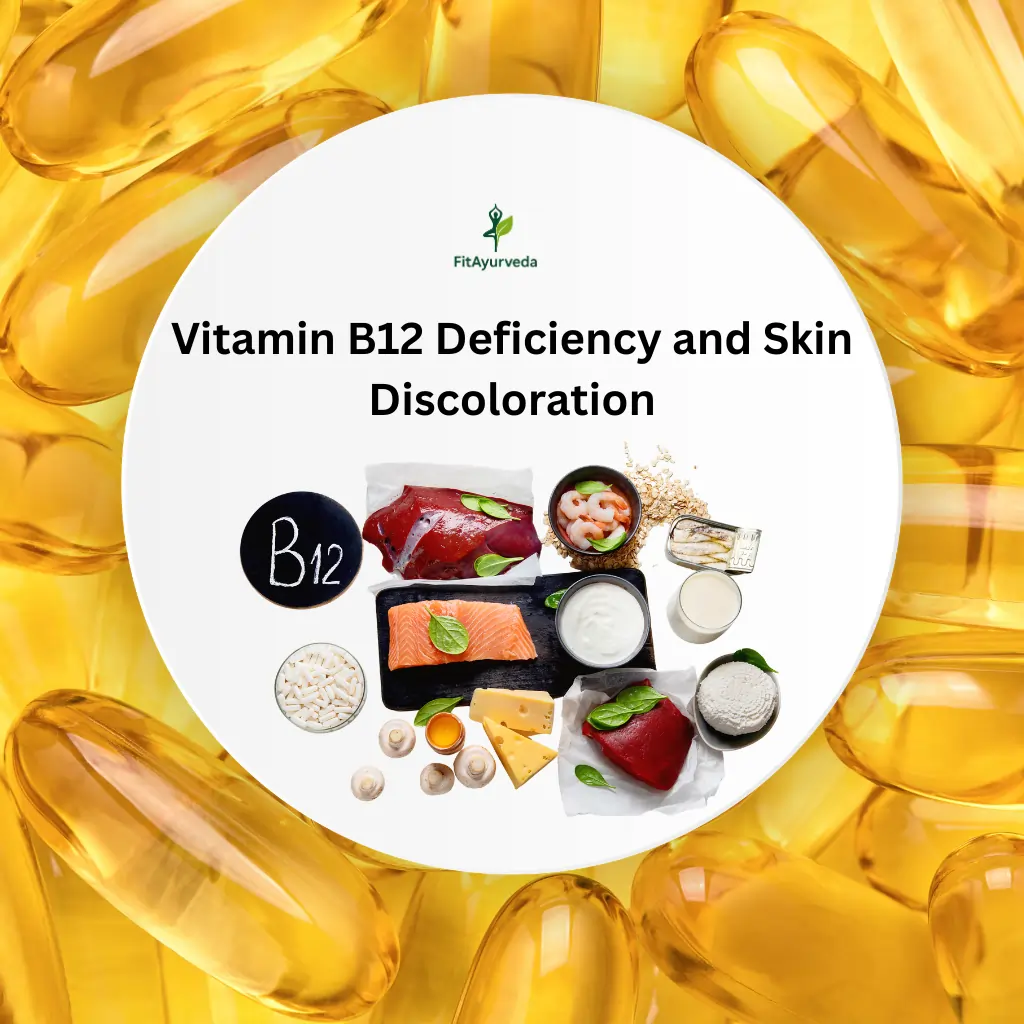Vitamin B12 Deficiency and Skin Discoloration: Signs, Causes & Ayurvedic Cure
Vitamin B12 deficiency skin discoloration is more common than most people realize — yet it often goes unnoticed until the skin starts showing visible signs. Have you been noticing unusual dark patches, pale spots, or uneven skin tone that just doesn’t seem to fade away? While many rush to creams and facials, the real reason could be something deeper happening inside your body.
Vitamin B12, also known as cobalamin, is an essential nutrient that supports red blood cell production, nerve function, and cell renewal. It also plays a key role in maintaining healthy, glowing skin. When your body doesn’t get enough of this vital vitamin, your cells don’t get the oxygen and nourishment they need. The result? Fatigue, dullness, hyperpigmentation, and in some cases, noticeable skin discoloration due to Vitamin B12 deficiency — especially around the hands, neck, and face.
Modern lifestyles, poor diet choices, and digestive imbalances have made Vitamin B12 deficiency surprisingly common, even among those who think they eat well. The good news is, Ayurveda offers time-tested natural remedies to restore your internal balance, improve nutrient absorption, and revive your natural complexion — without harsh chemicals.
In this guide, we’ll uncover the powerful connection between Vitamin B12 deficiency and skin discoloration, explore its hidden causes, early symptoms, and share Ayurvedic ways to naturally heal and bring back your skin’s healthy glow from within.
Also Read: Can Low B12 Cause Hair Loss?
What Is Vitamin B12 and Why Does It Matter for Skin Health?
Vitamin B12, also called Cobalamin, is a water-soluble vitamin that plays a crucial role in your body’s energy production, red blood cell formation, and nerve function. It’s often called the “energy vitamin,” but its influence goes far beyond that — especially when it comes to skin health.
Your skin is the largest organ of your body and constantly renews itself. New skin cells are formed in the deeper layers and replace the older ones on the surface. This renewal process depends on a steady supply of oxygen and nutrients through healthy blood circulation — something Vitamin B12 directly supports by aiding in red blood cell production.
When your Vitamin B12 levels drop, your blood may not carry enough oxygen to skin tissues. Over time, this leads to visible changes such as:
-
Uneven pigmentation or dark patches
-
Dull and pale skin tone
-
Slow wound healing
-
Dryness or premature wrinkles
In modern medicine, these are seen as symptoms of nutritional deficiency. But Ayurveda looks deeper into the root cause.
According to Ayurveda, low B12 levels indicate an imbalance of Pitta Dosha (which governs metabolism and blood formation) and Rakta Dhatu (the blood tissue responsible for nourishment and skin color). When Pitta and Rakta are disturbed, the skin loses its natural glow and clarity, resulting in discoloration, rough texture, and uneven tone.
Thus, maintaining healthy Vitamin B12 levels isn’t just about preventing fatigue or nerve issues — it’s essential for keeping your skin vibrant, youthful, and evenly toned from within.
How Vitamin B12 Deficiency Causes Skin Discoloration
Skin discoloration can often be one of the earliest visible signs of Vitamin B12 deficiency, yet it’s also one of the most misunderstood. While many people assume dark spots or uneven tone are caused only by sun exposure or hormonal changes, your skin’s true glow actually begins from within — at the cellular level.
When your body lacks enough Vitamin B12, red blood cell production slows down. These cells are responsible for carrying oxygen throughout your body — including your skin tissues. A reduced oxygen supply means your skin cells don’t receive the nourishment they need to stay healthy and rejuvenated. Over time, this imbalance results in:
-
Hyperpigmentation: Areas such as the hands, knuckles, and face may appear darker or patchy due to increased melanin production triggered by cellular stress.
-
Pale or yellowish skin: A lack of healthy red blood cells can cause pallor or an unhealthy skin tone.
-
Dull complexion: Without proper oxygen and nutrient flow, the skin loses its brightness and natural moisture balance.
-
Slow cell renewal: The skin becomes more prone to dryness, rough texture, and uneven tone.
Interestingly, research has found that vitamin B12 deficiency skin discoloration can often mimic other skin conditions — making it difficult to identify unless the root cause is checked through a blood test.
From an Ayurvedic perspective, this occurs due to a disturbance in Rakta Dhatu (the blood tissue) and Pitta Dosha, which govern color, heat, and blood purity in the body. When Pitta becomes aggravated — often from poor diet, stress, or weak digestion (Agni) — it leads to toxins or Ama accumulating in the blood. This buildup reflects on the skin as dark patches, uneven tone, or pigmentation issues.
In short, skin discoloration due to Vitamin B12 deficiency isn’t just a cosmetic issue — it’s your body’s way of signaling an inner imbalance that needs attention.
Ayurvedic View on Vitamin B12 Deficiency and Skin Discoloration
Ayurveda doesn’t describe “Vitamin B12 deficiency” directly, but it explains similar symptoms under Ras Dhatu Kshaya (nutritional tissue depletion) and Rakta Dushti (impure blood).
According to Ayurvedic principles:
-
Rasa Dhatu (nutrient plasma) nourishes the skin.
-
Rakta Dhatu (blood tissue) gives the skin its color, glow, and vitality.
-
When both become weak due to poor digestion (Agnimandya), stress, or poor diet, skin pigmentation and vitality decline.
In Ayurvedic terms:
-
Vata imbalance → dryness, dullness
-
Pitta imbalance → redness, inflammation, pigmentation
-
Kapha imbalance → patchiness, sluggish skin renewal
The Ayurvedic cure focuses on balancing Agni (digestive fire), purifying the blood, and restoring Dhatu strength naturally.
Ayurvedic Remedies for Vitamin B12 Deficiency and Skin Health
Ayurveda uses herbs, detox therapies, and nutrient-rich foods to restore balance from within.
Here are some effective Ayurvedic remedies for managing Vitamin B12-related skin discoloration:
Blood-Purifying & Skin-Nourishing Herbs
-
Manjistha (Rubia cordifolia):
Purifies blood and reduces pigmentation. -
Guduchi (Tinospora cordifolia):
Boosts immunity and supports liver function. -
Amla (Indian Gooseberry):
Rich in natural Vitamin C, enhances nutrient absorption. -
Shatavari:
Restores vitality and supports Dhatu formation. -
Ashwagandha:
Improves energy levels, supports nervous system, and helps with fatigue.
You can find these in Ayurvedic formulations like:
-
Mahamanjisthadi Kwath – for blood detox
-
Chyawanprash – for Rasayana (rejuvenation)
-
Ashwagandha Lehyam – for strength and stamina
Ayurvedic Diet Plan for Vitamin B12 Deficiency and Skin Health
Since Vitamin B12 is mainly found in animal foods, vegetarians often face deficiency. Ayurveda suggests Ahara (food) that enhances digestion and absorption, improving natural B12 production via gut bacteria.
Recommended Foods:
-
Cow’s milk and ghee (rich in B12 and easy to digest)
-
Fresh curd or buttermilk
-
Moong dal, lentil soups, and seasonal vegetables
-
Beetroot, spinach, and drumstick leaves (support blood health)
-
Sprouted grains and soaked almonds
-
Jaggery and sesame seeds (for iron and skin glow)
Foods to Avoid:
-
Processed and deep-fried foods
-
Excess coffee, tea, or alcohol
-
Overeating or skipping meals
-
Heavy dairy at night (can cause Ama buildup)
Ayurvedic Tip:
Add Triphala powder at bedtime (with warm water) to detoxify the system and improve nutrient absorption.
Self-Care & Lifestyle Tips (Dinacharya for Healthy Skin)
Ayurveda emphasizes lifestyle as the root of long-term healing.
Try incorporating these habits:
-
Start your day with lukewarm water and lemon: Cleanses toxins.
-
Oil massage (Abhyanga) with sesame or coconut oil: Improves blood flow and skin texture.
-
Daily exposure to morning sunlight: Boosts Vitamin D, indirectly supporting B12 metabolism.
-
Early bedtime and mindful eating: Balances Agni and supports skin rejuvenation.
-
Include meditation or yoga: Reduces stress that worsens skin issues.
Recommended yoga poses:
-
Bhujangasana (Cobra Pose)
-
Sarvangasana (Shoulder Stand)
-
Matsyasana (Fish Pose)
These improve blood circulation and enhance skin vitality.
When to See a Doctor or Ayurvedic Specialist
If your skin discoloration persists for more than 2–3 months, or you experience:
-
Tingling in hands or feet
-
Persistent fatigue
-
Mouth ulcers or tongue redness
-
Memory issues
Then consult your physician or an Ayurvedic specialist for evaluation.
They may recommend blood tests (Vitamin B12 levels, CBC, homocysteine) and a customized Ayurvedic Rasayana plan.
How Long Does It Take to Recover Skin Tone?
Skin improvement varies by person.
-
Mild deficiency: 2–3 months of proper diet and herbs
-
Moderate deficiency: 4–6 months of consistent treatment
-
Severe deficiency: May require supplements plus Ayurvedic therapies like Panchakarma and Rasayana
Patience and consistency are key — skin health improves gradually as internal balance is restored.
FAQs
Q1: Can Vitamin B12 deficiency cause dark spots on the skin?
Yes, prolonged deficiency can increase melanin imbalance, leading to dark spots or patches, especially on the face and hands.
Q2: How can Ayurveda help treat B12 deficiency naturally?
Ayurveda works by improving digestion, enhancing nutrient absorption, and balancing Doshas through herbs, diet, and lifestyle therapy.
Q3: Can vegetarians prevent Vitamin B12 deficiency?
Yes, by including dairy products, fermented foods, and Ayurvedic digestive herbs like Triphala and Guduchi to support gut bacteria that synthesize B12.
Q4: Does pigmentation reverse after treating Vitamin B12 deficiency?
In most cases, yes. Once levels are restored and the skin gets adequate nutrition, discoloration gradually fades.
Q5: Which Ayurvedic therapies help with B12-related skin issues?
Therapies like Abhyanga (oil massage), Virechana (detox), and Rasayana chikitsa (rejuvenation therapy) are effective in restoring healthy skin tone.
Conclusion
Your skin is a mirror of your internal health.
Vitamin B12 deficiency doesn’t just cause fatigue or nerve issues — it can also reflect through uneven skin tone, pigmentation, and dullness.
By understanding this connection and adopting Ayurvedic remedies — from herbs like Manjistha and Guduchi to mindful eating and daily routines — you can heal naturally from within.
If you suspect B12 deficiency, don’t ignore the signs. Early correction through diet, herbs, and professional guidance can restore both your energy and your skin’s natural glow.
Disclaimer
The information provided in this article is for educational and informational purposes only. It is not intended to replace professional medical advice, diagnosis, or treatment. Always consult a qualified healthcare provider or certified Ayurvedic practitioner before starting any new diet, supplement, or treatment for Vitamin B12 deficiency or skin concerns.
Learn more about Vitamin B12 from NIH

